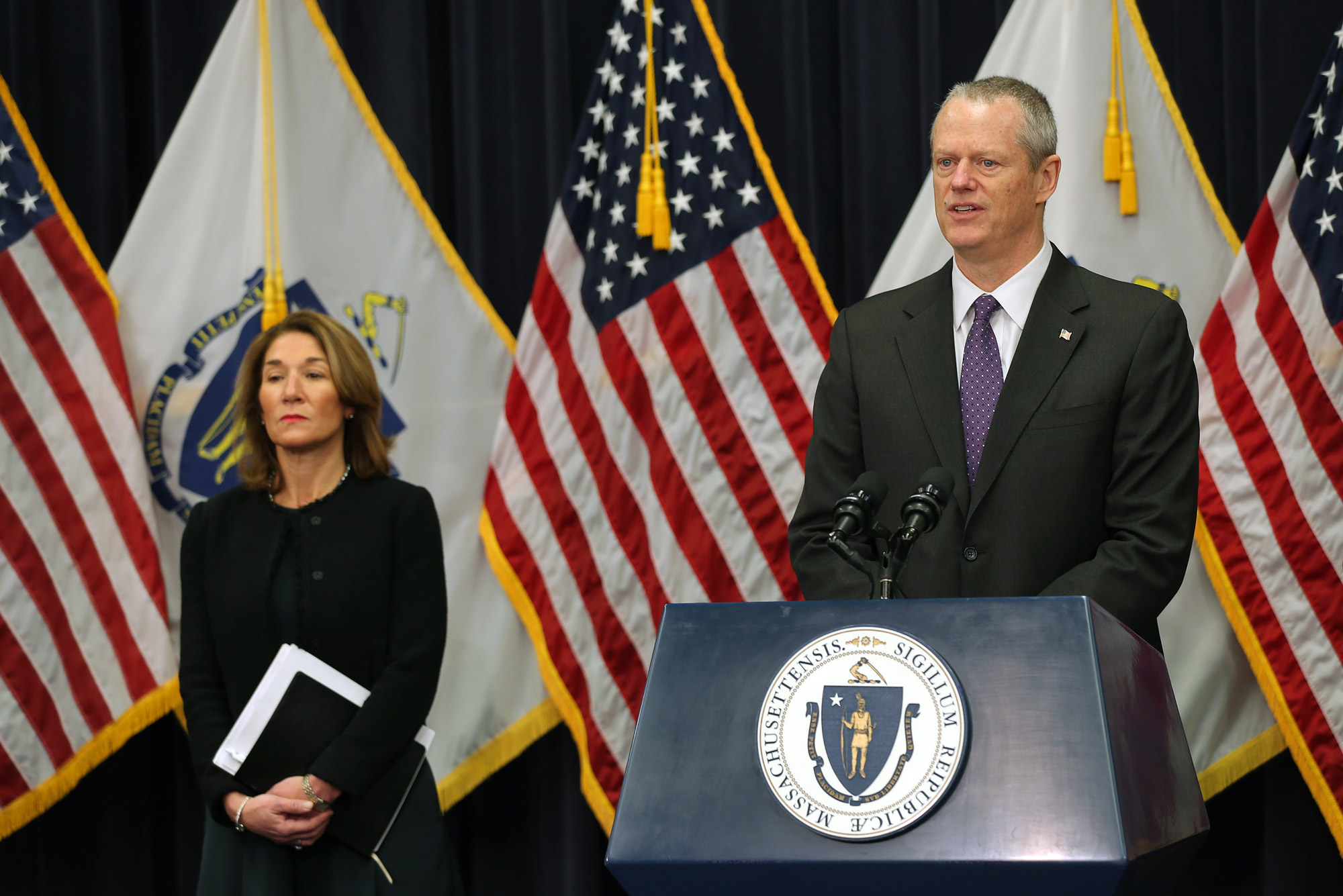BU Will Continue Running As Is Under Baker Orders; higher education among businesses deemed essential

Governor Baker has ordered all Massachusetts nonessential businesses to close to both customers and employees, effective March 24 at noon. Photo by Boston Globe/Getty Images
Governor’s Stay-at-Home Advisory Allows BU to Remain on Course
Teaching remote classes from campus can continue, non–COVID-19 research to be minimized
With COVID-19 cases continuing to rise statewide, Governor Charlie Baker on Monday directed the Department of Public Health to issue a “stay-at-home advisory” for all Massachusetts residents, effective on Tuesday, and ordered nonessential businesses to close. BU faculty can continue their remote teaching from campus and other University workers deemed essential can also come to work.
How Baker’s order impacts BU:
- Remote teaching and learning is permitted to continue as it has been, and faculty are allowed to come to campus to conduct their online classes.
- BU research labs should stop normal operations and shift to basic maintenance only, ensuring safety and preserving future capabilities, other than COVID-19 research and essential biomedical research that cannot be stopped at this time. Only critical maintenance procedures that require regular attention in order to maintain laboratory viability should continue.
- Staff members who are deemed essential to maintaining campus operations may continue to come to campus.
- There will be no change to the current housing situation; students who have permission to remain on BU’s campus can stay, and dining services will operate.
The University’s public safety officials believe a BU identification card will be sufficient to identify essential faculty and staff employees. The University is also providing access to an “Essential Employee Designation Letter” that employees may print to document their essential employee status, as a supplement to their ID.
In his Monday daily briefing, Baker ordered that all Massachusetts “nonessential businesses” close to both customers and employees, effective Tuesday, March 24, at noon. This order will be effective through Tuesday, April 7, at noon. But a list of workers exempted from the order includes those needed in higher education.
“Universities and colleges have been categorized as ‘essential services’ within this order, meaning that it will not directly impact our current plans to provide remote teaching to all students and essential support functions to those students who remain on our campuses,” Jean Morrison, University provost and chief academic officer, wrote in a memo to faculty and staff. “While all faculty are encouraged to work from home where possible, those who choose to come to campus to conduct their remote teaching are still allowed to do so under the Governor’s new order.”
I do not believe I can or should order US citizens to be confined to their home for days on end.
The University’s administrative offices remain open to support remote education, research, and student services. As most staff have transitioned to working remotely, only academic and administrative personnel whose jobs require them be on campus are being asked to commute.
Baker also directed the state Department of Public Health to issue a “stay-at-home advisory” for the same effective dates. While not a shelter-in-place order, this advisory formally urges residents to stay at home when possible and avoid all nonessential activities, while observing social distancing.
Travel is not banned, and the order doesn’t prevent people from going food shopping, receiving medical treatment, or going outside to exercise. Groceries, pharmacies, and medical marijuana dispensaries will stay open, as will gas stations. Restaurants can still offer takeout and delivery. The MBTA will continue to run, but residents are encouraged not to use it.
Baker said the advisory is serious, but different from a “shelter-in-place” order. “I do not believe I can or should order US citizens to be confined to their home for days on end,” he said at a press conference. “It doesn’t make sense from a public health point of view, and it’s not realistic.”
For those concerned about campus access once they get here, Rene Fielding, BU emergency management director, says buildings remain open to those who have a right to enter them, under essentially the same procedures used during intersession, using an ID card and key access.
“ID cards and key access have not been interrupted. The buildings are not closed to those who have legitimate access, as is the case during intersession,” Fielding says. “This step needed to be taken primarily for security reasons. BUPD is aware of concerns by remaining occupants in lightly occupied buildings concerned about their personal safety and the openness of external doors.”

Comments & Discussion
Boston University moderates comments to facilitate an informed, substantive, civil conversation. Abusive, profane, self-promotional, misleading, incoherent or off-topic comments will be rejected. Moderators are staffed during regular business hours (EST) and can only accept comments written in English. Statistics or facts must include a citation or a link to the citation.